Blockchain Course Syllabus And Modules
4.9 out of 5 based on 10587 votesLast updated on 23rd May 2024 23.74K Views
- Bookmark

The Blockchain Technology Syllabus aims to equip students with a deep understanding of blockchain technology. For more, read this blog post.
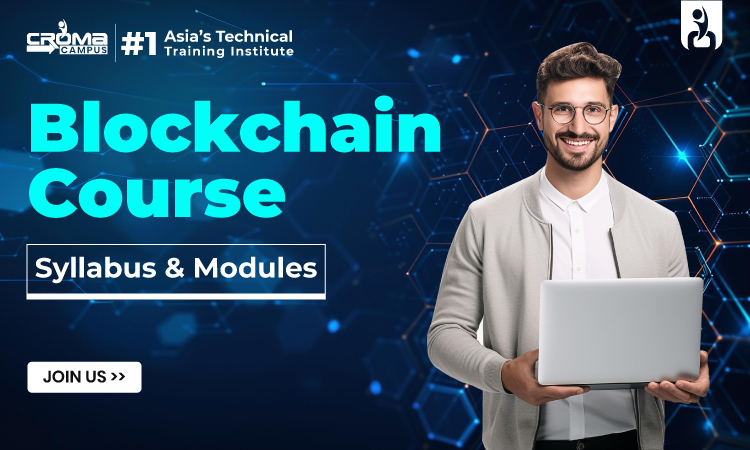
Introduction
Embarking on a journey through the transformative realm of blockchain technology, this Blockchain Course offers a gateway to understanding its intricacies and applications. From its inception to its current standing as a disruptive force across industries, blockchain's decentralized architecture and cryptographic principles have reshaped digital transactions.
This guide lays the foundation for an exploration into the Blockchain Course Syllabus, blockchain's inner workings and its profound impact on the modern world.
An Overview Of The Blockchain Course Syllabus
Course Overview
This Blockchain Technology Syllabus is designed to provide students with a comprehensive understanding of blockchain technology, its underlying principles, and its applications across various industries. The course will cover both theoretical concepts and practical applications, ensuring students gain the skills needed to develop and manage blockchain solutions.
The Syllabus of Blockchain Technology is divided into modules that progressively build on each other, from basic concepts to advanced topics.
Course Objectives
Let us look at the objectives of the Blockchain Developer Course Syllabus in detail.
- Understand the fundamentals of blockchain technology and its components.
- Explore different Blockchain subjects, platforms, and their unique features.
- Learn how to develop and deploy smart contracts.
- Analyse the impact of blockchain on various industries.
- Gain hands-on experience with blockchain development tools and frameworks.
Note: If you are staying in Delhi/NCR and looking for Blockchain Training in Noida, Do visit Croma Campus and get free consultation and the best course as per your requirements. We do provide 100% job assistance as well.
Blockchain Course Modules
Module 1: Introduction to Blockchain Technology
Topics Covered in this Blockchain Module:
- History and evolution of blockchain
- Basic concepts: decentralization, consensus mechanisms, cryptography
- Key components: blocks, chains, nodes, miners
- Types of blockchains: public, private, consortium
Learning Outcomes:
- Describe the historical context and development of blockchain technology.
- Understand the core components and concepts of blockchain.
- Differentiate between various types of blockchain networks.
Module 2: Cryptographic Foundations
Topics Covered:
- Cryptographic hash functions
- Public and private keys
- Digital signatures
- Merkle trees
Learning Outcomes:
- Explain the role of cryptography in blockchain.
- Utilize cryptographic techniques to secure data.
- Understand the structure and importance of Merkle trees.
Module 3: Blockchain Platforms and Ecosystems
Topics Covered in this Blockchain Module:
- Overview of major blockchain platforms: Bitcoin, Ethereum, Hyperledger, Corda
- Comparative analysis of platform features
- Blockchain as a Service (BaaS)
- Case studies of platform applications
Learning Outcomes:
- Compare and contrast different blockchain platforms.
- Identify appropriate blockchain platforms for specific use cases.
- Evaluate the benefits and limitations of BaaS offerings.
Module 4: Smart Contracts and Decentralized Applications (DApps)
Topics Covered:
- Definition and characteristics of smart contracts
- Ethereum Virtual Machine (EVM)
- Writing and deploying smart contracts using Solidity
- Introduction to DApps and their architecture
Learning Outcomes:
- Develop and deploy smart contracts on the Ethereum blockchain.
- Understand the function and architecture of DApps.
- Explore the potential applications of smart contracts across industries.
Tips: Blockchain technology revolutionizes industries by providing secure, transparent, and decentralized systems. A Blockchain Certification can enhance your career, demonstrating expertise in this emerging field.
Module 5: Blockchain Development Tools and Frameworks
Topics Covered in this Blockchain Module:
- Development environments: Truffle, Remix
- Blockchain APIs and libraries
- Setting up a private blockchain network
- Testing and debugging blockchain applications
Learning Outcomes:
- Utilize blockchain development tools to create and manage blockchain applications.
- Set up and configure a private blockchain network.
- Implement and test blockchain solutions effectively.
Module 6: Consensus Mechanisms and Protocols
Topics Covered:
- Proof of Work (PoW)
- Proof of Stake (PoS)
- Delegated Proof of Stake (DPoS)
- Practical Byzantine Fault Tolerance (PBFT)
Learning Outcomes:
- Understand various consensus mechanisms used in blockchain networks.
- Evaluate the pros and cons of different consensus protocols.
- Choose suitable consensus mechanisms for different blockchain applications.
Module 7: Blockchain Security and Privacy
Topics Covered:
- Common security threats in blockchain
- Mitigating attacks: 51% attack, Sybil attack, replay attack
- Privacy-enhancing technologies: zk-SNARKs, ring signatures
- Regulatory and compliance considerations
Learning Outcomes:
- Identify and address security vulnerabilities in blockchain networks.
- Implement privacy-preserving techniques in blockchain solutions.
- Understand regulatory and compliance requirements related to blockchain.
Note: Croma Campus is one of the leading EdTech companies for providing Blockchain Developer Training. You can check the details about the course, fees and duration.
Module 8: Blockchain Use Cases and Industry Applications
Topics Covered:
- Financial services: cryptocurrencies, cross-border payments, DeFi
- Supply chain management
- Healthcare
- Government and public services
- Emerging applications: NFTs, IoT integration
Learning Outcomes:
- Analyse the impact of blockchain technology in various industries.
- Identify real-world problems that can be solved using blockchain.
- Evaluate case studies and successful implementations of blockchain solutions.
Module 9: Future Trends and Challenges
Topics Covered:
- Scalability and interoperability
- Quantum computing and blockchain
- Advances in consensus algorithms
- The future of blockchain regulation and governance
Learning Outcomes:
- Discuss emerging trends and challenges in blockchain technology.
- Predict the potential future developments in the blockchain space.
- Prepare for the evolving landscape of blockchain technology and its applications.
Tips: Cryptocurrency is revolutionizing the financial world. With Cryptocurrency Online Training, you can gain the knowledge and skills to understand and navigate the digital currency landscape.
Module 10: Capstone Project
Topics Covered:
- Project proposal and planning
- Development and implementation
- Testing and validation
- Presentation and demonstration
Learning Outcomes:
- Apply the knowledge and skills acquired throughout the course to a real-world project.
- Demonstrate the ability to develop a complete blockchain solution.
- Present and defend the project in front of peers and instructors.
You May Also Read These Posts:
Blockchain Interview Questions
How Blockchain Technology Works
Course Materials
Here are the course materials that cover Blockchain Developer Course Syllabus.
- Textbooks: "Mastering Bitcoin" by Andreas M. Antonopoulos, "Blockchain Basics" by Daniel Drescher
- Online resources: Ethereum and Hyperledger documentation, online tutorials
- Software: Ethereum, Hyperledger Fabric, Truffle, Remix
Assessment Methods
- Quizzes and assignments on various Blockchain subjects
- Practical labs and exercises
- Midterm and final exams
- Capstone project evaluation
Prerequisites
Let us look at the prerequisites before starting with the Syllabus of Blockchain Technology.
- Basic understanding of programming concepts
- Familiarity with web development (HTML, CSS, JavaScript)
- Introduction to cryptography (optional but recommended)
This Blockchain Technology Syllabus aims to equip students with a deep understanding of blockchain technology and the ability to create practical blockchain solutions, preparing them for careers in this rapidly evolving field.
Note: Bitcoin, a decentralized digital currency, offers secure and fast transactions. Enhance your knowledge with Bitcoin Online Training to understand its blockchain technology and market trends.
Conclusion
In conclusion, this comprehensive Blockchain Course in Delhi equips students with both theoretical knowledge and practical skills, enabling them to develop and manage blockchain solutions effectively. By covering a wide range of topics from cryptographic foundations to real-world applications, this Blockchain Course Syllabus prepares students for careers in the rapidly evolving blockchain industry.
Subscribe For Free Demo
Free Demo for Corporate & Online Trainings.
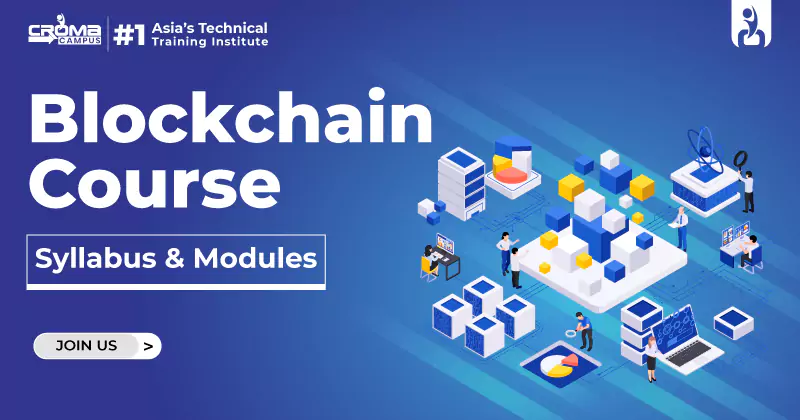
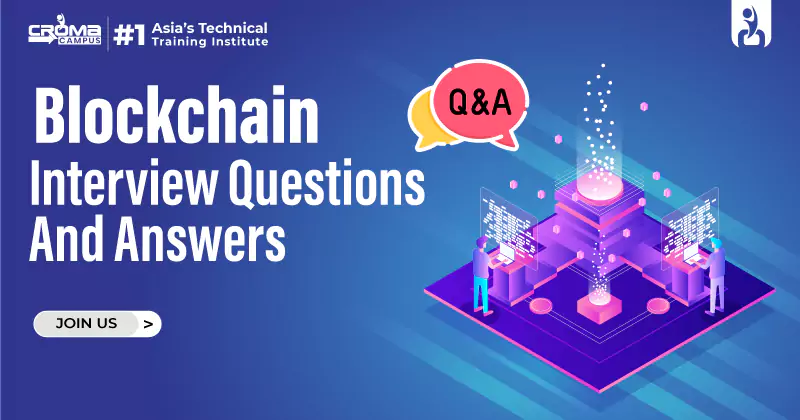

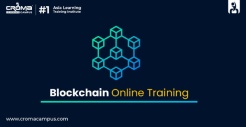
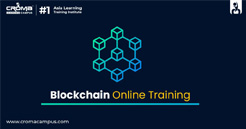

















.webp)

.png)















